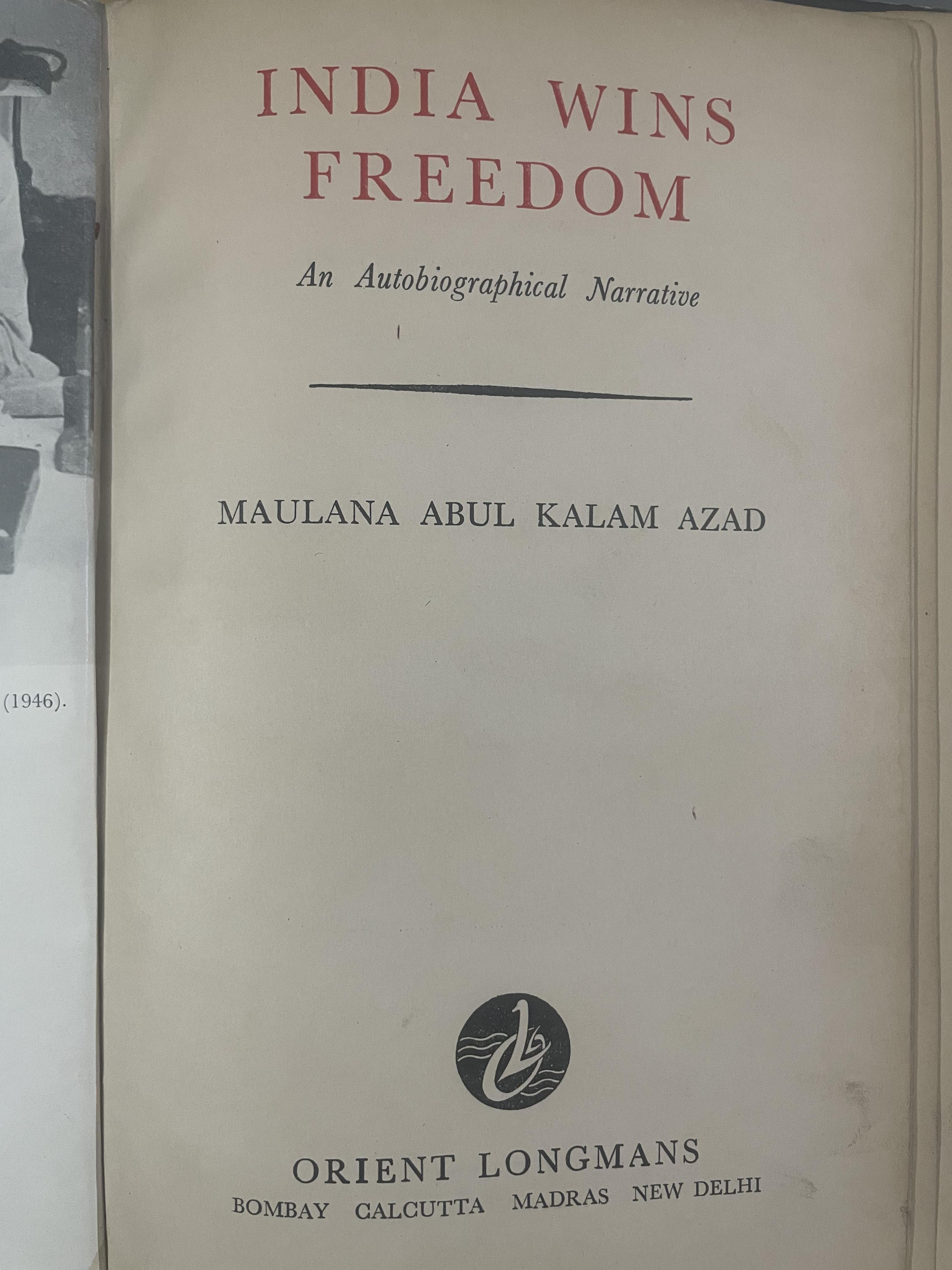India wins Freedom

About
Summary
Exquisite
TOC
Details
Related
URL
Images
Overview
India Wins Freedom, penned by Maulana Abul Kalam Azad, offers a personal and political narrative of India's struggle for independence, spanning from the 1920s to 1947. Azad, a prominent figure in the Indian National Congress (INC) and the first Minister of Education in independent India, provides an insider's perspective on the events, negotiations, and personalities that shaped the nation's destiny. The book recounts Azad's experiences as a young revolutionary, his role in the INC, his interactions with Mahatma Gandhi, Jawaharlal Nehru, Muhammad Ali Jinnah, and other key leaders, and his staunch opposition to the partition of India.
The book was narrated by Maulana Abul Kalam Azad to his secretary, Humayun Kabir, between 1956 and 1958. It was first published in 1958, offering the world a rare insight into India's struggle for freedom. A complete version was published in 2003.India Wins Freedom is both an autobiography and a political history, recounting India's history from the 1920s until its independence in 1947, from a man who lived it himself. Azad's narrative encompasses his early life, his entry into politics, and his involvement in the Indian National Congress. He sheds light on the negotiations with the British government, the Cripps Mission, the Cabinet Mission, and the interim government. Azad also shares anecdotes and personal observations about prominent leaders, revealing their characters, ideologies, and political inclinations. A significant portion of the book is devoted to the events leading to the partition of India, which Azad vehemently opposed. He believed in a united India where Hindus and Muslims could coexist harmoniously. As the first Education Minister, Azad discusses his vision for an independent India, emphasizing the importance of a strong and inclusive education system to remove societal disparities and uplift the underprivileged.
Importance of Book
Historical Significance: India Wins Freedom is a valuable historical document that provides a firsthand account of the Indian independence movement from the perspective of a prominent leader.
Understanding Azad's Perspective: The book offers insights into Azad's political views, his commitment and his vision for a secular and inclusive India.
Insights into the Minds of Leaders: Azad shares personal observations and anecdotes about prominent leaders, providing a glimpse into their personalities, motivations, and decision-making processes.
Understanding the Partition: The book offers a detailed account of the events leading to the partition of India, the political factors involved, and the human cost of this tragic event.
Fresh Perspective: The book provides a fresh perspective on the history of India's struggle for freedom, presenting the raw emotions, personal beliefs, and unfiltered thoughts of one of the country's founding fathers.
Key Themes
The Indian Independence Movement: The book's central theme is India's struggle for independence, viewed through the experiences and perspectives of a key leader in the movement.
Hindu-Muslim Unity: Azad was a staunch advocate for Hindu-Muslim unity and believed in a united India. He opposed the partition and worked tirelessly to bridge the divide between the two communities.
The Partition of India: The book delves into the events leading to the partition, the political dynamics involved, and the tragic consequences that followed. Azad expresses his disappointment over the division of the country and its devastating impact on the people.
Azad's Vision for Independent India: Azad outlines his vision for a secular, inclusive, and progressive India, with a focus on education, social justice, and national unity.
Critique of Political Decisions: Azad provides a critical analysis of the decisions made by various leaders, including Gandhi, Nehru, Patel, and Jinnah, highlighting their errors and the consequences of their actions.
Cultural Significance
Reflection of a Nation in Transition: The book reflects the hopes, aspirations, and anxieties of a nation undergoing a transformative period in its history.
Understanding India's Political History: The book provides insights into the complex political landscape of pre-independence India, the challenges faced by the leaders, and the decisions that shaped the nation's destiny.
Promoting Secularism and Inclusivity: Azad's emphasis on secularism, religious harmony, and inclusivity promotes these values in Indian society.
Guiding Future Generations: India Wins Freedom serves as a guide for future generations, urging them to strive for unity, secularism, and inclusivity.
Personal Experiences: It includes his personal experiences and observations during the struggle for independence.
Effects on Society
Shaping Public Discourse: The book has influenced public discourse in India, particularly on issues related to history, politics, and national identity.
Promoting National Unity: Azad's message of national unity and его efforts to bridge the divide between Hindus and Muslims have contributed to promoting social cohesion in India.
Informing Policy Decisions: Azad's vision for an inclusive and progressive India has informed policy decisions in areas such as education, social justice, and minority rights.
Understanding the freedom movement: The book gives a seat at the table where everything was planned, negotiated, fought, and gives insight into the political life of Maulana Azad's struggle for freedom.
Highlights errors committed: The book highlights errors committed by key leaders like Gandhi, Jinnah, Nehru, and Patel.
Conclusion
India Wins Freedom is a significant contribution to the literature on the Indian independence movement. Maulana Abul Kalam Azad's personal account offers valuable insights into the events, personalities, and political dynamics that shaped the nation's destiny. The book's cultural significance lies in its emphasis on secularism, inclusivity, and national unity, values that remain relevant in contemporary India. Despite the pain and disappointment associated with the partition, Azad's vision for a united and progressive India continues to inspire generations of Indians. The book serves as a reminder of the sacrifices made during the freedom struggle and the importance of preserving the values & social justice.
Title
India wins Freedom
Author
Maulana Abdul Kalam Azad
Name of Publisher
Orient Longmans Bombay Printed by V N Bhattacharya
Publish Date
1959
Subject
Azad?s personal observations and experiences
Vintage
1948-2000
Number of Pages
252
Category
Literary
Sub Category
Indian freedom
Rarity
RARE
